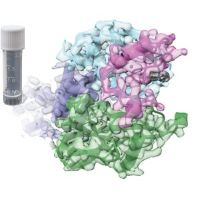Specification
| Description | Recombinant protein from the full-length sequence of Homo sapiens potassium two pore domain channel subfamily K member 17 (KCNK17), transcript variant 1 (NM_031460). |
| Organism | Homo sapiens (Human) |
| Expression Host | Human Cells |
| Tag Info | His or DYKDDDDK. Please contact us if you need further information or require specific designed tag. |
| Purity | Greater than 90% by SDS-PAGE gel |
| Uniprot ID | Q96T54 |
| Entry Name | KCNKH_HUMAN |
| Gene Names | KCNK17 TALK2 TASK4 UNQ5816/PRO19634 |
| Alternative Gene Names | TALK2 TASK4 |
| Alternative Protein Names | Potassium channel subfamily K member 17 (2P domain potassium channel Talk-2) (Acid-sensitive potassium channel protein TASK-4) (TWIK-related acid-sensitive K(+) channel 4) (TWIK-related alkaline pH-activated K(+) channel 2) (TALK-2) |
| Application | Antigens, Western, ELISA and other in vitro binding or in vivo functional assays, and protein-protein interaction studies; For research & development use only! |
| Buffer | Purified protein formulated in a sterile solution of PBS buffer, pH7.2, without any preservatives |
| Endotoxin | Endotoxin level is < 0.1 ng/µg of protein (<1EU /µg) |
| Length | 332 |
| Molecular Weight(Da) | 36895 |
| Protein Sequence | (The sequence of expressed protein may have some variation from the sequence shown below. Please contact us for the exact sequence.) MYRPRARAAPEGRVRGCAVPSTVLLLLAYLAYLALGTGVFWTLEGRAAQDSSRSFQRDKWELLQNFTCLDRPALDSLIRDVVQAYKNGASLLSNTTSMGRWELVGSFFFSVSTITTIGYGNLSPNTMAARLFCIFFALVGIPLNLVVLNRLGHLMQQGVNHWASRLGGTWQDPDKARWLAGSGALLSGLLLFLLLPPLLFSHMEGWSYTEGFYFAFITLSTVGFGDYVIGMNPSQRYPLWYKNMVSLWILFGMAWLALIIKLILSQLETPGRVCSCCHHSSKEDFKSQSWRQGPDREPESHSPQQGCYPEGPMGIIQHLEPSAHAAGCGKDS |
Background
| Function | FUNCTION: Outward rectifying potassium channel. Produces rapidly activating and non-inactivating outward rectifier K(+) currents. |
| Pathway | |
| Protein Families | Two pore domain potassium channel (TC 1.A.1.8) family |
| Tissue Specificity |
QC Data
| Note | Please contact us for QC Data |
| Product Image (Reference Only) |  |

